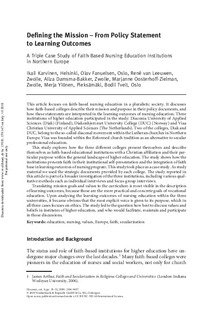| dc.contributor.author | Karvinen, Ikali | |
| dc.contributor.author | Fanuelsen, Olav Emil | |
| dc.contributor.author | van Leeuwen, René | |
| dc.contributor.author | Damsma-Bakker, Aliza | |
| dc.contributor.author | Oosterhoff-Zielman, Marjanne | |
| dc.contributor.author | Ylönen, Merja | |
| dc.contributor.author | Tveit, Bodil | |
| dc.date.accessioned | 2018-09-27T07:23:50Z | |
| dc.date.available | 2018-09-27T07:23:50Z | |
| dc.date.created | 2018-08-30T15:01:02Z | |
| dc.date.issued | 2018 | |
| dc.identifier.citation | Diaconia. Journal for the Study of Christian Social Practice. 2018, 9 (1), 32-52. | nb_NO |
| dc.identifier.issn | 2196-9027 | |
| dc.identifier.uri | http://hdl.handle.net/11250/2564840 | |
| dc.description.abstract | This article focuses on faith-based nursing education in a pluralistic society. It discusses how faith-based colleges describe their mission and purpose in their policy documents, and how these statements are interpreted in the learning outcomes of nursing education. Three institutions of higher education participated in the study: Diaconia University of Applied Sciences (Diak) (Finland), Diakonhjemmet University College (DUC) (Norway) and Viaa Christian University of Applied Sciences (The Netherlands). Two of the colleges, Diak and DUC, belong to the so-called diaconalmovement within the Lutheran churches in Northern Europe. Viaa was founded within the Reformed church tradition as an alternative to secular professional education.
This study explores how the three different colleges present themselves and describe themselves as faith-based educational institutions with a Christian affiliation and their particular purpose within the general landscape of higher education. The study shows how the institutions presents faith in their institutional self-presentation and the integration of faith base in learning outcomes of nursing program. This study took place as a case study.As study material we used the strategic documents provided by each college. The study reported in this article is part of a broader investigation of the three institutions, including various qualitative methods such as individual interviews and focus-group interviews.
Translating mission goals and values to the curriculum is most visible in the description of learning outcomes, because those are the more practical and concrete goals of vocational education. Upon analysing the learning outcomes of nursing education within the three universities, it became obvious that the most explicit voice is given to its purpose, which in all three cases focuses on ethics. The study led to the question how best to discuss values and beliefs in institutes of higher education, and who would facilitate, maintain and participate in those discussions. | nb_NO |
| dc.language.iso | eng | nb_NO |
| dc.publisher | Vandenhoeck & Ruprecht | nb_NO |
| dc.subject | education | nb_NO |
| dc.subject | nursing | nb_NO |
| dc.subject | values | nb_NO |
| dc.subject | Europe | nb_NO |
| dc.subject | faith | nb_NO |
| dc.subject | secularization | nb_NO |
| dc.subject | utdanning | nb_NO |
| dc.subject | sykepleie | nb_NO |
| dc.subject | verdier | nb_NO |
| dc.subject | Europa | nb_NO |
| dc.subject | tro | nb_NO |
| dc.subject | sekularisering | nb_NO |
| dc.title | Defining the mission - from policy statement to learning outcomes. A triple case study of faith-based nursing education Institutions in Northern Europe | nb_NO |
| dc.type | Journal article | nb_NO |
| dc.type | Peer reviewed | nb_NO |
| dc.description.version | publishedVersion | nb_NO |
| dc.rights.holder | Open Access | nb_NO |
| dc.source.pagenumber | 32-52 | nb_NO |
| dc.source.volume | 9 | nb_NO |
| dc.source.journal | Diaconia. Journal for the Study of Christian Social Practice | nb_NO |
| dc.source.issue | 1 | nb_NO |
| dc.identifier.doi | https://doi.org/10.13109/diac.2018.9.1.32 | |
| dc.identifier.cristin | 1605600 | |
| cristin.unitcode | 251,1,0,0 | |
| cristin.unitcode | 251,3,0,0 | |
| cristin.unitname | Fakultet for teologi, diakoni og ledelsesfag | |
| cristin.unitname | Fakultet for helsefag | |
| cristin.ispublished | true | |
| cristin.fulltext | original | |
| cristin.qualitycode | 1 | |
